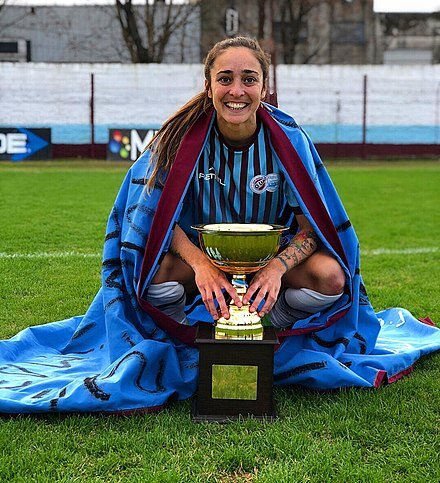Boca Defeats River Plate in Historic Women’s Soccer Match in Argentina
Macarena Sanchez spearheaded the legal movement for the professionalization of Argentina’s women's soccer league (Wikipedia).
The Boca Juniors beat rivals River Plate 5-0 on October 8 in the first Superclásico game in Argentina's professional women’s soccer league. This match represents a historic day for the progress of gender equality movements in athletics throughout the nation.
The Superclásico is one of the most intense rivalries in the world of sports. The two dominant clubs in Argentina, Boca Juniors and River Plate, draw the unrivaled attention of the entire nation when they face off. The local rivalry oftentimes exacerbates contentious political sentiments and occasionally introduces violence. In fact, clashes between the fans forced the second leg the 2018 Cup of Liberators to be postponed.
However, the most recent matchup between these teams had a new flair for the first time. On September 24, the first professionally recognized Superclásico took place between the two women’s club teams.
In a nation were soccer dominates much of the cultural fabric, the official recognition of the women’s league, and this important match, marks a historic day.
In March, Argentina’s soccer association announced that its women’s league would officially become professional. The league has existed since 1991 but only at an amateur level. The lack of professional recognition made it impossible for Argentina’s top female players to sign stable, well-paying contracts.
The Argentine Football Association (AFA) was pressured into professionalizing the women’s league after a successful lawsuit filed by Macarena Sanchez. In 2018, she was dismissed by the UAI Urquiza team, prompting her to “launch a legal complaint seeking compensation and professional status.” The lawsuit generated support from the players’ union, prompting AFA President Claudio Tapia to announce that the league would be officially categorized as professional.
“When we assumed responsibility, we said we were going to oversee inclusive soccer that is gender equal, and we are demonstrating that,” said Tapia.
Many, however, have pointed out that this is only the start of the overhaul needed to achieve gender equality in Argentine soccer.
“With this we are generating a legal framework and a way to be able to advance professionally. This is the base, it is the beginning. It is in each of us to develop it,” said Sergio Marhci, the representative of the players’ union.
The development will require overcoming many barriers. Pay is still highly unequal between men and women at the top levels. The salaries in the professional women's league are equivalent to those for men in the country's fourth division. Moreover, the lack of television contracts given to the women’s league has made it difficult for the women’s clubs to generate revenue.
The inequality that exists in Argentine soccer parallels the global fight for increased gender equality in the salaries of professional soccer players. During the 2018 Women’s World Cup, social pressure for inclusivity and equality in the sport surged. For example, the U.S. Women’s national team launched a lawsuit against the U.S. Soccer Federation and suggested the pay discrepancy between their team and the less successful men’s team was “institutionalized gender discrimination.”
The country has taken other steps, such as placing a bid to host the 2023 Women’s World Cup. Though this is only the tip of the iceberg, it is a necessary step in the long list of changes that the country seeks to make.
“This will affect those who are younger, who can take this activity more seriously as a future, a job. So that generations to come can develop and play starting from when they are young,” said Banfield forward Mariana Frambati.

